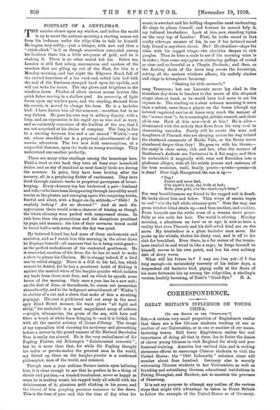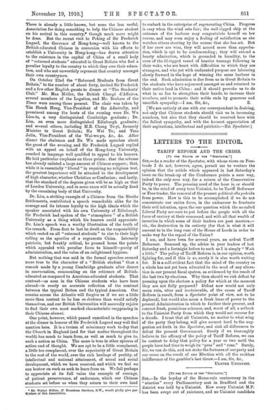CORRESPONDENCE.
GREAT BRITAIN'S INFLUENCE ON YOUNG CHINA.
[To TIM Enrros OP TIM "Bracrrros.'] Sra,—A certain very small proportion of Englishmen realise that there are a few Chinese students working at one 01 another of our Universities, or in one or another of our manu- facturing towns. Still fewer Englishmen realise the real importance of doing all that in them lies to foster the desire of clever young Chinese to visit England for study and pro- fessional training. America has realised this, and is making strenuous efforts to encourage Chinese students to visit the United States: the "1900 Indemnity " scholars alone will number about four hundred. Germany also is warmly welcoming Chinese students to her Universities, as well as founding and subsidising German educational institutions in Peking, Shanghai, and Hankow, not to mention the province of Shantung.
It is not my purpose to attempt any outline of the various steps that might with advantage be taken in Great Britain to follow the example of the United States or of Germany. There is already a little-known, but none the less useful, Association for doing something to help the Chinese student on his arrival in this country,* though much more might be done. But the recent visit to Peking of Sir Frederick Lugard, the Governor of Hong-kong—well known to the British-educated Chinese in connexion with his efforts to establish a University in Hong-kong—has drawn attention to the existence in the capital of China of a small body of "returned students" educated in Great Britain who feel a peculiar loyalty to the country to which they owe their educa- tion, and who not unworthily represent that country amongst their own countrymen.
On October 22nd the "Returned Students from Great Britain," to the number of about forty, invited Sir Frederick and a few other English guests to dinner at " The Students' Club." Mr. Max Muller, the British Charge d'Affaires, several members of the Legation, and Mr. Braham of the Times were among those present. The chair was taken by Tan Hsueh Heng, Vice-President of the Admiralty, and prominent among the hosts of the evening were Dr. Wu Lien-te, a very distinguished Cambridge graduate ; Dr. Lim, an even more distinguished Edinburgh graduate ; and several others, including H.E. Chang Te-yi, formerly Minister to Great Britain; Ha Wei Te; and Tsao Julin, Vice-President of the Wai-wu-pn, &c., &c. After dinner the chairman and Dr. Wu made speeches about the guest of the evening, and Sir Frederick Lugard replied with an appeal on behalf of the Hong-kong University, couched in language well qualified to appeal to his hearers. He laid particular emphasis on three points : that the scheme has already enlisted a large amount of Chinese support ; that, while it is essentially "liberal" in requiring no religious test, the greatest importance will be attached to the development of high character, whether Christian or Confucian ; and lastly, that the standard of the degrees given will be as high as that of London University, and in some cases will be actually fixed by the examining body of that University.
Dr. Lim, a striking example of a Chinese from the Straits Settlements, contributed a speech remarkable alike for its courage and its intense loyalty to the high ideals which the speaker associated with his own University of Edinburgh. Sir Frederick had spoken of the "atmosphere " of a British University as a thing which his bearers could appreciate. Dr. Lim's speech was a worthy illustration of the truth of the remark. From first to last he dwelt on the responsibility which rested on all "returned students " to rise to their high calling as the apostles of a regenerate China. Intensely patriotic, but frankly critical, he pressed home the points which appealed with peculiar force to himself—purity of administration, and the value of an enlightened hygiene.
But nothing that was said in the formal speeches seemed more true to the character of a " British student " than a remark made by a young Cambridge graduate after dinner in conversation, commenting on the reticence of British- educated as compared to American-educated students. That contrast—as seen in the Chinese students who have been abroad—is surely an accurate reflection of the contrast between the typical Briton and the typical American. Our cousins across the Atlantic will forgive us if we are a little more than content to be less en evidence than would satisfy themselves, and our British Universities will assuredly rejoice to find their own most marked characteristic reappearing in their Chinese alumni.
One point, however, which passed unnoticed in the speeches at the dinner in honour of Sir Frederick Lugard may well find mention here. It is a truism of missionary work to-day that the Church in England (and for that matter throughout the world) has much to learn from, as well as much to give to, such a nation as China. The same is true in other spheres of action and of thought. We are apt to be a little complacent, a little too complacent, over the superiority of Great Britain to the rest of the world, over the rich heritage of probity, of intellectual and national attainment, of moral and social development, which we have received, and which we feel we can bestow on such as seek to learn from us. We fail perhaps to appreciate at its full value the example of courage, of patient perseverance, of endurance, which our Chinese students set before us when they return to their own land
• Sir Walter Hillier, 27 Branham Gardens, S.W., would gladly give par- ticulars of this Association.
to embark in the enterprise of regenerating China. Progress is easy when the wind sets fair; the well-rigged ship at the entrance of the harbour may congratulate herself on her course, and may even enjoy a feeling of satisfaction as she watches others steering by the course that she has set. But if her crew are wise, they will accord more than approba- tion, which is apt to be condescending ; they will extend a hearty admiration, which is grounded in humility, to the crew of the ill-rigged vessel of heavier tonnage following in their wake, who are beset with difficulties to which they are strangers, and who yet with undaunted purpose are labouring slowly forward in the hope of winning the same harbour in the end. Such admiration is due from us in Great Britain to the students who have sojourned amongst us and returned to their native land in China : and it should provoke us to do what in us lies to strengthen their hands, to increase their numbers, and to promote their noble ends by generous and
unselfish sympathy.—I am, Sir, &o., Z.
[We are entirely at one with our correspondent in desiring, not only that Chinese students should visit us in increasing numbers, but also that they should be received here with the fullest sympathy, and with the keenest appreciation of their aspirations, intellectual and patriotic.—En. Spectator:I



































































 Previous page
Previous page